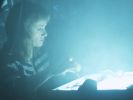Eye For Film >> Movies >> Far From The Apple Tree (2019) Film Review
Far From The Apple Tree
Reviewed by: Jennie Kermode

Tales of troublesome doubles go back at least as far as the twin gods of Zurvanism in the fourth century BCE and probably far beyond, yet it is cinema, more than any other art form, that has emerged as their natural home. In Scotland they have a particular resonance stemming from James Hogg's electrifying 1824 novel The Private Memoirs And Confessions Of A Justified Sinner, connecting them both to mental illness and to the Devil in the popular imagination. Grant McPhee's film draws on these traditions for a film that is distinctly Scottish in character yet echoes mythology from all around the world. It's set in one of those generationally inhabited large country houses decorated with curiosities from all around the globe, a place that reflects colonial history yet conjures also the sense of a modern world colonised by an uncanny something deeply rooted in the human soul.
Into this world steps Judith (Sorcha Groundsell), a photography student young and naive enough that when an artist she admires invites her to agree to a deal as yet unspoken, she says yes. Her task, as it's presented to her, is to archive the work of Roberta Roslyn (Victoria Liddelle). As is all too common these days, she isn't getting paid - something friends warn her about - but she's excited by the learning opportunity that the 'sort of residence' offers, and Roberta, despite her brusqueness, seems genuinely interested in teaching her. There's also a chance to make some really good connections, the promise of a solo show, and something else...

A fan of Roberta's work for some time, Judith has been intrigued by a young woman who appears in a lot of her early photographs and video installations. This is Maddy, the artist's daughter, whose physical resemblance to Judith is marked. She's no around just now, Roberta explains, but she'll come back when she's ready. There's a hint of mystery here which Judith finds more and more intriguing. As Roberta urges her to find her own identity as an artist, she finds herself more and more absorbed by the woman in the pictures who seems much more confident and complete than she does. As her health unexpectedly begins to decline, it becomes easier and easier for her to lose herself in the work she's given, but deep inside, she can't shake the feeling that something is wrong.
As a camera operator and digital imaging technician, McPhee has worked on the likes of Under The Skin, For those In Peril, The Wicker Tree and some of the scariest episodes of Game Of Thrones. The legacy of this work is clear in a film that makes extensive use of layered imagery, teasing the audience, keeping us aware that we're watching an actor portraying a character who is, perhaps, becoming confused with someone else. The film sometimes shifts format, keeping us conscious of its own illusory nature, throwing up apparent artefacts that don't occur accidentally with this filming method. Quick cuts connect material from different parts of this fictional universe, across time and space, in a way that blatantly suggests the subliminal, playing with contradictions. It's also dazzlingly beautiful, all the way through.
That the direction of the plot is apparent early on is not a weakness. The sense of inevitability surrounding Judith's predicament is part of what gives the film its power. Groundsell is impressive: the shift in Judith's personality is barely apparent over time but striking when, towards the end, we see her as she was during her first encounter with Roberta. The dynamics between the all-female cast members suggest a complex hierarchy with ancient roots and intersect neatly with McPhee's folk horror imagery, which is also expressed through aspects of Roberta's art.
The production design here is exquisitely detailed and complemented by careful lighting choice that generally keep things realistic but sometimes throw in a hint of giallo. The sound design is superb and contributes significantly to the atmosphere. Judith's determination to confront the uncanny as an artist and keep learning from it means that McPhee is free to make is setting as creepy as he likes without audience members feeling that it's unrealistic for her to stay. There's also some superb musical work - layered like the visuals - which provides specific reference points for those in the know but also works at a visceral level.
Whilst it has its flaws - one might almost argue that it needs them for the effect to be complete - this is an excellent piece of work. No doubt some viewers will be turned off by its unwillingness to compromise for the sake of accessibility, but others will fall in love.
Reviewed on: 04 May 2019















